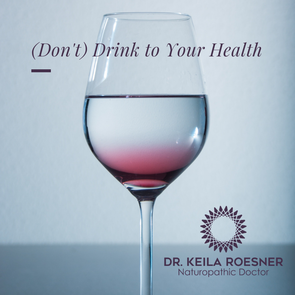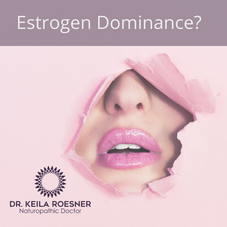 You’re careful about your health. You do your best to eat well, and you pay attention to the ways that your diet affects your energy levels....but something seems off. You’re experiencing annoying symptoms that you can’t explain. You’re often gassy and bloated, your skin may not be clear and glowing anymore, you may be ready for a nap after a meal and you wish you could remember where you put your keys. Why does your memory feel so foggy? These issues are frustrating (and often embarrassing) and they’re also very common. Many patients that come to see me are already living a fairly healthy lifestyle, but are baffled by continuing digestive issues, mysterious rashes, and low energy levels. If this sounds familiar, it may be time to take a good look at your diet. Even a “healthy” food can make you sick if your body is sensitive to it, even if you're eaten it your whole life without issues until now. For many, the food mystery becomes both frustrating and overwhelming when trying to understand what foods are nourishing you and not making you feel terrible. The good news is that you may not have to look very far to make changes that relieve your symptoms. With a bit of detective work, and a bit of help, you can map out a dietary plan that restores your well being. What are the Symptoms of Food Sensitivity? Food sensitivities can be tricky to diagnose. Symptoms can vary widely from person to person and can even be different depending on what else is happening in your body. For example, you might respond differently at different stages of your menstrual cycle, or if you’ve been under more stress or not sleeping as well. Food sensitivities can cause or contribute to:
Another reason why a food sensitivity is often a missed diagnosis is that these symptoms can be delayed up to 72 hours after a meal, so many people don’t make the connection between what they ate and how they feel. Even the most incredibly observant people can find it difficult to notice that they feel brain fog 3 days after eating a “normal” food. Similarly, it’s difficult to measure how many people suffer from food sensitivities because a lot of us don’t seek medical help, figuring that it’s “normal” to feel gassy and tired all of the time. In fact, conventional medical practitioners can be skeptical about food sensitivity symptoms, which can lead to frustration for patients. But it doesn’t have to be this way. What Causes Food Sensitivities? It’s important to recognize the difference between food allergies, food intolerances, and food sensitivities. Food allergies are immune reactions. After eating a certain food, your body’s immune system launches an attack by making its own protein, called immunoglobulin E (IgE). The next time you consume that food, your body is ready to attack again. The IgE causes your body to release a chemical called histamine, which triggers the physical symptoms of an allergic reaction. This is the type of allergy reaction one has to pollens and dander. With food, it can cause frightening anaphylaxis reactions. A food intolerance occurs when the body loses the ability to produce a certain digestive enzyme. Lactose intolerance occurs when the body cannot produce the lactase enzyme, and fructose intolerance occurs when a body cannot produce the fructase enzyme. Eating foods with lactose or fructose will then cause gas/bloating and diarrhea to occur (and can be a sign of Small Intestinal Bacterial Overgrowth).. A food sensitivity reaction occurs when you eat a food and it forms an antigen/antibody reaction. That is, a different part of your immune system binds to the food, the IgG reaction. Those immune complexes can cause intestinal and systemic problems in the body and mind. There are specialty labs that can detect this reaction. In our practice, we use Alletess Labs to identify these reactions.... and one blood draw can uncover up to 184 food sensitivity reactions! If we continue to eat that food sensitivity, the lining of the gut can become inflamed and damaged. Eventually, it can become permeable, so the undigested material “leaks” into the bloodstream. Not surprisingly, this is called “leaky gut” syndrome or intestinal hyperpermeability. What is the root cause of food sensitivities? And why are they becoming increasingly common? There are many medical reasons:
Which Foods Can Cause Food Sensitivities? Uncovering food sensitivities is a fantastic reason for seeing a Naturopathic Doctor – we have the tools to help identify if a particular food is making you sick. In addition, medical supervision can ensure your approach to food remains healthy and balanced. Research suggests that food sensitivities can be a trigger for disordered eating in some people. After all, if food is causing you pain, but you’re not sure which foods are to blame, it’s easy to associate your diet with negative experiences. How Can You Treat Food Sensitivities? At our office, we identify and address foods sensitivities with this approach:
Sometimes food sensitivities are only the tip of the iceberg and we have to go deeper and look to other causes of your symptoms. You can read more about that here. Uncovering food sensitivities is a truly a game-changer for many of our patients. If you suspect that something is off, I would love to offer you a complimentary Health Discovery session to see if our approach is right for you. Sources:
3 Comments
 A glass of wine with dinner. A beer after a hard day of work. It’s not hard to integrate an occasional drink with a healthy lifestyle. Whole genres of music are written essentially about drinking (I come from a country music family!). In recent years, we’ve read that red wine is rich with antioxidants, and that an occasional beer can raise “good” cholesterol or stimulate lactation for breastfeeding mamas. But results from a new study suggest that even moderate alcohol consumption - the kind we tell ourselves is healthy - may actually be detrimental to our health. In other words, the much-heralded health benefits of drinking don’t outweigh the risks. As a result, there is no safe level of alcohol consumption. A recently published research study looks at data collected in almost 700 studies, spanning 195 countries and territories. Some of the findings are startling:
The authors of the study are firm in their conclusion: “By evaluating all associated relative risks for alcohol use, we found that consuming zero standard drinks daily minimizes the overall risk to health.” In other words, the only safe amount of drinks is none at all. This finding differs from many earlier studies, which often concluded that moderate drinking was the best approach. Why did this study reach a more decisive conclusion than previous examinations of alcohol’s effect on health? Several factors come into play. This study was careful to consider the ways they measured consumption. For example, researchers looked at regional variations in alcohol consumption that could be attributed to things like tourism. In addition, the study looked at alcohol’s impact on 23 different health-related problems. For some of those problems (such as heart disease), mild alcohol consumption had a positive effect. But that positive effect was balanced by a greater negative impact on other health issues (cancer is a strong example). What does this mean for you? If you drink, should you stop? Alcohol consumption is a very personal decision. This study looked at the big picture, worldwide. It was not studying individuals, but rather analyzing vast amounts of data previously collected, specifically looking at the risks for the 23 health issues. That data was conclusive. But it’s up to you how you apply it to your own life. This latest study can’t, for example, tell you if it’s OK to have some wine for New Year’s given your own unique genetics and other lifestyle factors. One thing is clear: If you’ve told yourself that drinking is healthy, you may want to reconsider that rationale. That doesn’t necessarily mean you must immediately quit. However in deciding whether or not alcohol is something you want in your life, it’s best to be realistic about the health risks. If you’re wondering about alcohol, talk to a healthcare practitioner. And be upfront about your drinking during the visit. Many people underreport how much they drink, but it’s best to be honest. You want to have an open discussion about all of your health concerns. Remember that healthcare providers aren’t looking to judge you: they want to work with you to create your best life. You also want to look at your own medical history and perhaps check out more specific studies. For example, another recently published study concluded that alcohol is the biggest controllable risk factor for dementia. If you have other dementia risk factors that are out of your control, such as a genetic history, you may want take action on the things you can control. Similarly, if you have a history of depression, consider alcohol’s impact on mental health. If you are trying to control your weight, the extra calories of alcohol aren’t going to help. Alcohol can also lower your judgment and keep you from making your best decisions. Alcohol intake may also increase your risk of estrogen dominance, and is a well-established risk factor for breast cancer. Some patients express frustration at the different results they see in health studies: One minute something is good for you, then suddenly we need to avoid it! Studies on alcohol use can be proof that when we read an eye-catching health-related headline, we need to look beyond the numbers. One thing to keep in mind is that the media will typically seize the most dramatic sound bite, although it’s impossible to always convey the nuances of a well-run scientific study in a short headline. For example, a news story doesn’t always mention who funded the study. For the record, the Lancet study on alcohol safety was funded by the Bill and Melinda Gates Foundation, while some others that emphasized alcohol’s benefits were funded by companies who sell alcohol. That doesn’t necessarily mean the studies are false, but we should all remember the funders have a vested interest in how the results are reported. Follow the money! As well, correlation doesn’t always equal causation. That’s sometimes hard to capture in reporting large studies. In fact there are studies that show that Resveratrol an antioxidant found in red wine is beneficial to your health however if you have other health issues like digestion.htmlpoor gut function, low energy, sleep issues and more, alcohol will likely have negative impacts and could make your health issues worse. One can absolutely gather the benefits of resveratrol by eating organic grapes with the skin on, rather than drinking wine, without negatively affecting other health issues - but that doesn't make for sexy headlines! Whenever you’re confused about a health issue, the best approach is to consider it from a sample study of one: yourself. That means talking to a healthcare provider about your own personal history and choices and your current health concerns. We can help you sort through all of the information you face every day and figure out what’s best for your unique body, in fact we are experts in doing just that! Book your complimentary Health Discovery Consult to discuss YOUR unique health goals. References  Estrogen – it’s not a dirty word. Estrogen plays an important role through the course of our reproductive lives and beyond. It regulates our menstrual cycle, strengthens our bones, controls our cholesterol, and much more. When our estrogen levels go “out of tune” we experience PMS or menopausal symptoms. But even before menopause, varying levels of this vital hormone can wreak havoc. That’s because estrogen requires a delicate balance with other hormones. When that balance is disturbed, we can experience a wide range of frustrating symptoms. This hormonal imbalance often occurs during a particularly busy time of our lives, the period from about age 25 through to menopause. As a result, our practice sees many women who are dealing with unexplained weight gain, mood swings, and libido problems. But there is help available. A few simple steps can help you restore balanced estrogen levels and feel like yourself again. How Do You Know if You Have Estrogen Dominance? Estrogen dominance can impact many areas of our lives, with symptoms that range from subtle shifts to major disruptions in wellbeing. Many women in this age group assume these issues are a normal part of aging or a consequence of their busy schedules. Just because it is common, does NOT make it a healthy normal! Even a slight imbalance in hormone levels can lead to a number of problems. Symptoms can vary greatly by person, but often include:
Does that list look familiar? I see many women in my practice each month with complaints like these. I totally understand how frustrating they can be, especially when you’re unable to find effective treatment. And, of course, the complex relationship between estrogen and our emotions can only magnify the frustration. Who wants to feel irritated about feeling irritable? It’s not only women who can experience estrogen dominance. You may be surprised to know that men can suffer an excess of estrogen as well. In men, estrogen dominance can manifest a bit differently, with some of these symptoms being common:
What Causes Estrogen Dominance? To understand estrogen dominance, we have to consider the role of another important hormone, progesterone. Progesterone and estrogen maintain an often tricky seesaw in our bodies. Prior to menopause, the balance shifts at different stages of the menstrual cycle. Estrogen dominance isn’t necessarily a surge of estrogen, but an imbalance in that seesaw. Simply put, estrogen dominance happens when the seesaw tips to one side because there is not enough progesterone to balance out the estrogen. There’s actually no “set” number we can measure that proves an estrogen dominance diagnosis. It’s the overall hormonal profile that is important – the DUTCH test is an extremely valuable tool that I use regularly for assessing this balance. How does estrogen become dominant? A key factor is the timing. Or, to be more specific, the time of our lives. Consider a normal menstrual cycle during our reproductive years: After we ovulate mid-cycle, our bodies produce progesterone to balance out estrogen. But as we near menopause, we often have some menstrual cycles when we do not ovulate. As a result, there is not enough progesterone to balance out the estrogen. Enter estrogen dominance -- and its long list of possible symptoms. To a certain extent, estrogen dominance is a natural part of our aging process. However, recent years have seen a rise in estrogen-dominance complaints, and our busy lifestyle may be a big factor. Environmental and behavior issues can increase estrogen levels, tipping the seesaw even further. What’s to blame? Take a look at this list.
How Can You Restore Hormone Levels? Our practice can work with you to re-balance your hormonal havoc. Starting with an accurate diagnosis, we can create a lifestyle plan that works for you. As a starting point, these changes are recommended:
Do the estrogen dominance symptoms sound a bit too familiar? Please contact our clinic and we’ll get to the bottom of what’s going on and create a plan of action to bring your body back to good health. References  Is PMS ever normal? Is PMS ever normal? I had a new patient come into my office this week. A lovely, sweet young woman, she was concerned about her fertility and hormone health because since coming off the Pill, she felt "like a crazy person" 3 weeks of the month. She sat in my office and said "It's not enough. It's not fair that I only get one good week a month. What am I doing wrong?" She is right. So many women believe they have to put up with their periods. The cramps, the mood swings, the bloating (although in my books, you NEVER need an excuse to wear comfy pants!), the crappy libido... we're often told that we just need to suck it up. If we're expecting to have an average of 450 menstrual cycles throughout our lifetime (minus pregnancies) it is simply not enough to put up with feeling awful. The first step is information. Our sex-ed classes often focus so much on STI and pregnancy prevention (thankfully that's changing) and dry biology lessons that fail to teach young girls how to read their body's clues. Here's what IS normal:
Hormonal imbalances like low thyroid function, anxiety (YES, this can be caused by hormones!), heavy periods... or periods that have gone MIA or are ridiculously painful, infertility and mood swings from hell are NEVER normal. These things are common, but certainly not normal. A healthy woman that eats well, exercises the right amount for her body, gets enough rest (this is NOT just Netflix time), quality sleep and generally takes care of her body should not be experiencing these things. And she knows it. Masking it with medication is not the answer. Nor is powering through it for yet another awful cycle, or being told that she's crazy for asking questions about her ahead or being irrational or a hypochondriac. The answer is HONESTY. Has "everything" really and truly been tried? Consistently tried? For how long? If she is still drinking coffee like a Gilmore Girl or wine like a leading lady on Sex & The City, staying up too late or pretending that everything is OK because she's on the Pill "to regulate" per periods we're not being honest. Honesty with your health care provider should look like open communication, a commitment to lifestyle and dietary factors FIRST and if things are not improving, looking at the right tests. Looking outside the box where necessary. Consistent follow up and frank discussions about what is normal, what isn't. A completely personalized approach to fit YOUR needs. Coming from a 15+ year personal history of hormonal issues that resulted in so many missed periods, crazy hair loss, weight gain and terrible acne, I WISHED a physician back then would have taken this approach with me. Not that anyone was negligent... far from it. Most just didn't have the right tools. This same progressive approach that I take with women every. single. day. in my practice. The person-centred, I-actually-give-a-damn-about-you approach that helps you get back your cycle, get pregnant, age with grace, keep your sex drive and grow into the (boss) lady you are meant to be... it WORKS. If you are experiencing anything else, you may have a subtle.. or more obvious.. hormone imbalance. Your period should NOT be a nightmare. Let me help. Set up a complimentary Health Discovery Session with me. I love this video. Keep in mind that many of the symptoms we consider "normal" like bloating, acne and moodiness CAN be modified with an individualized Naturopathic plan to keep you feeling at the top of your game. |
Top 75 Naturopath Blogs & Websites For Naturopathic DoctorsAuthorDr. Keila Roesner is a Naturopathic Doctor. When not treating patients she is also an enthusiastic barefoot-strolling, music-loving, yoga-doing kitchen wiz - who also happens to be a wrestling fan. Categories
All
|
Let us take you from hormonal to whole.
|
Dr. Keila Roesner, BHSc ND
Naturopathic Doctor, Hormone Warrior and Your Wellness Cheerleader 247 Church Street, Stratford ON N5A 2R7 (519) 273-0900 [email protected] |
|









 RSS Feed
RSS Feed